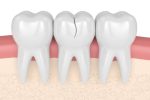
Yes, you can still get cavities from tooth decay, even if you brush and floss every day. Good oral hygiene does not guarantee the lack of tooth decay, which is a shock to many people. If you’re worried about dental cavities in Grande Prairie, you are not alone. This blog post will discuss a number of reasons that tooth decay happens to those taking care of their teeth and what you can do to minimize your cavities.
Table of Contents
What are Cavities?
Cavities, also known as dental cavities, are holes in your teeth from tooth decay. Tooth decay is caused by the damaging effects of bacteria in your mouth that produce acid. The acid breaks down your tooth enamel. If not caught early, your cavity can grow much larger and cause potential pain and infection.
Can You Still Get Cavities if You Brush and Floss Daily?
You bet. Let’s discuss a few reasons cavities happen with an oral hygiene routine:
- Areas Between Your Teeth You Can’t See: There are some places that even when you brush and floss, you can’t fully clean. Most often, these ducts are between teeth in the areas we can most miss brushing, especially grooved spikes on chewing surfaces. Over time, harmful plaque can grow in this area, leading to cavities.
- Diet plays a part: With snacking or eating food that has sugar or is acidic, such as soda or candy, bacteria can produce more acid. A small bleed to be aware of is that brushing after eating, but especially if you do not do anything else during the day, you are at risk of constant snacking.
- Dry Mouth: Saliva is your friend. Saliva also helps wash away food particles and neutralize acid. Whereas with a dry mouth, whether all the time or due to breathing through your mouth, your teeth can be more at risk of forming cavities. With dry mouth due to medication or for other medical reasons, drink a lot of water! This will help with cavity formation.
- Your Brushing Technique: Brushing twice a day is fantastic, but if you’re brushing incorrectly, you can inadvertently miss some plaque! Make sure you’re brushing gently in a circular motion for a full two minutes as opposed to rushing through it.
- Fluoride Connection: Fluoride can help strengthen your enamel and fight decay. If your water does not have fluoride, be aware that not having fluoride toothpaste or fluoride mouthwash, in both cases, your teeth are likely more vulnerable.
- Genetic: Some people are inherently more likely to get cavities due to their genetics of tooth shape, enamel strength, diet, or bacterial composition during birth.
What Are the Signs You Might Have a Cavity?
It’s not always easy to tell, especially in the early stages. But here are a few warning signs to look out for:
Symptom | What It Might Mean |
Tooth sensitivity | Decay is weakening the enamel |
Mild to sharp pain | The cavity may be growing |
Visible holes or dark spots | Decay is already damaging the tooth |
Bad breath | Bacteria and decay could be the cause |
Regular checkups with a dentist in Grande Prairie can help catch these signs early before the cavity gets worse.
How Can You Protect Your Teeth?
Preventing cavities takes more than just brushing and flossing. Even if you’re doing everything right, cavities despite good oral hygiene, can still develop. That’s why it’s important to take a few extra steps:
- Drink plenty of water to help wash away acids and food particles.
- Cut back on sugary snacks and drinks.
- Use fluoride toothpaste and ask your dentist about fluoride treatments.
- Visit your dentist twice a year for cleanings and exams.
- Consider dental sealants, which are thin coatings that protect the chewing surfaces of your back teeth.
These habits, combined with consistent oral hygiene, can go a long way in reducing your risk.
Keep Your Smile Strong with Gateway Dentistry Group
Even with your best efforts, cavities can still happen—and that’s okay. What matters most is catching them early and taking steps to keep your teeth healthy. At Gateway Dentistry Group, we care about helping you and your family maintain strong, confident smiles.
Whether it’s time for your next checkup or you’re concerned about a cavity, our friendly team is here to support your dental health journey every step of the way. Book your appointment with Gateway Dentistry Group today and get the care your teeth deserve!








